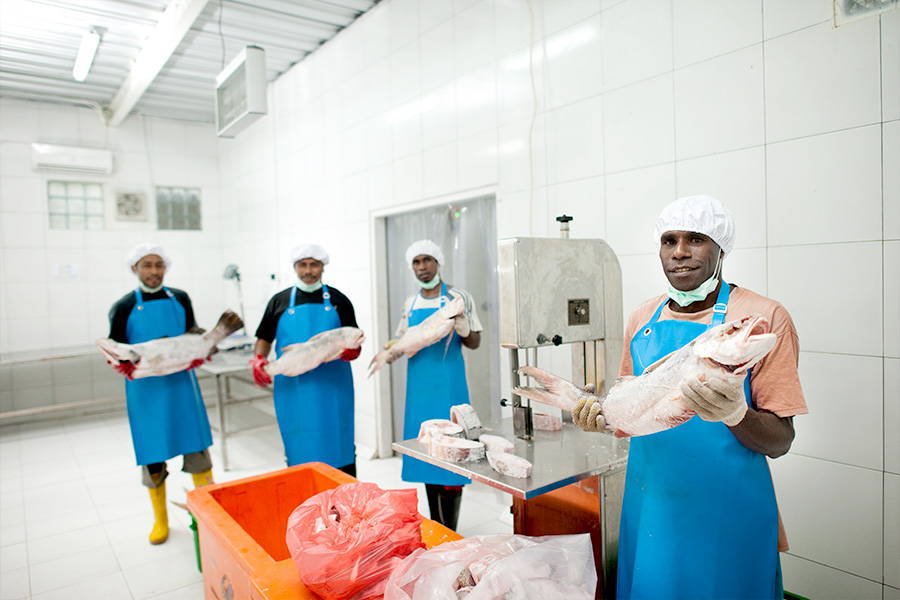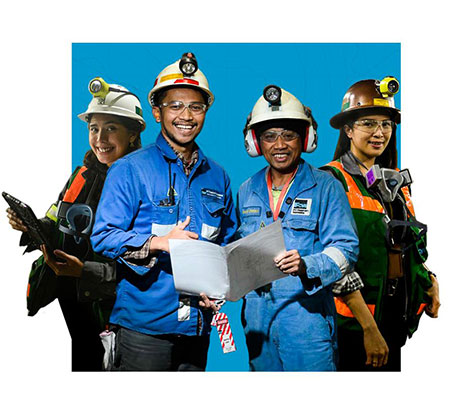19 April 2022

Papua is a paradise at the eastern tip of Indonesia which is rich in natural resources. One of them is marine resources where Papuan people can live by relying on it as a source of livelihood. Kamoro is one of the tribes who make fishing a job to raise their welfare. Through the establishment of the Maria Bintang Laut Cooperative (KMBL) by the Timika Diocese, the Kamoro tribal community living on the coast of Mimika Regency, Papua, has succeeded in developing its economic potential. KMBL has around 120 active members of fishermen from eight villages in Mimika, namely Koperapoka and Nayaro (New Mimika Districts); Nawaripi (Wania), Tipuka (East Mimika); and Ayuka, Fanamo, Omawita, and Otakwa (Far Eastern Mimika).
Through the cooperative, their captured seafood is purchased and distributed to business partners through one door. However, cooperatives also face challenges in meeting the quota. The amount of fish deposited for processing at the cooperative's fish factory is still small and insufficient. Donatus (right) and Amatus cut the frozen fish caught by Kamoro fishermen in the cold storage facility belonging to KMBL, Timika, Papua, Thursday (17/3/2022). (Kompas/Wisnu Widiantoro) "Our purchase target from coastal communities is 3 tons per month. That means 36 tons a year even though throughout 2021 it was only 21 tons," said Agus Suryanata, KMBL field coordinator, Thursday (17/3) afternoon, in front of the cooperative fish factory.
The cooperative's factory is located within the Timika Diocese complex right in the downtown area of Timika. It is indeed quite far, about 40 km from the nearest coastal area in Pomako, East Mimika. However, Kamoro fishermen do not have to go all the way to Timika. Agus said that KMBL has provided four fish collection centers on the coast, including in Pomako and Otakwa, so that fishermen can immediately sell their catch. It is PT Freeport Indonesia (PTFI), a metal mining company that has been operating in Mimika for half a century, which helps fishermen to obtain competitive prices than in the general market, which is the buyer partner of various marine products caught by them. With the cooperation of PTFI and KMBL, various commodities can be maximized, for example, white snapper or barramundi which are the prima donna fish in Mimika, and can be valued at up to Rp35,000 per kilogram.
Other marine products, such as bobara, sea milkfish, and rat grouper, were purchased at Rp17,000 per kg, higher than the general price of Rp12,000 per kg. It is then processed into steaks or filets. The sea catfish, which is valued at Rp5,000-Rp7,000 per kg, will be processed into jambal (oval body slightly flat) salted fish. Most of the produce, especially barramundi, milkfish, and bobara, will be sent by KMBL to PT Pangansari Utama (PSU), a catering service contractor that serves around 32 thousand employees and PTFI partner companies according to orders. If the supply at the KMBL factory is excessive, fish can be stored in the factory's cold room with a capacity of 40 tons. Workers store boxes containing pieces of fish caught by Kamoro fishermen in the cold storage facility at the fish processing factory owned by KMBL, Timika, Papua, Thursday (17/3/2022). (Kompas/Vishnu Widiantoro)
KMBL actually can guarantee a constant income and profit for the Kamoro fishermen who are members of the KMBL. However, to empower and make the community economically independent, this facility does not seem to be fully utilized. Sophia Tapilatu, the person in charge of the fishery program at PTFI's Community Affairs Division who assists the KMBL, admitted that various factors cause the supply from cooperative members to be so low. The first factor is the weather of the Mimika which is often hit by big waves, rain, and strong winds throughout the year. As a result, fishermen do not dare to go to the sea and only catch fish in rivers near estuaries on the coast. Moreover, Kamoro fishermen are deep water fishermen, precisely in rivers. "Hence, bad weather can greatly affect the production of the KMBL fish factory," said Sophia. The second factor is the existence of village fund programs or projects from various agencies that have intensively entered coastal villages in the past year making the community stop fishing temporarily and switch to other jobs. "This also causes the supply of fish to us to decrease. When there is no more income from other programs, people usually just go out looking for fish," explained Sophia.
Enliven the business
KMBL still has to think to meet PT PSU's demand, which is at least 20 tons a month or 240 tons a year. Agus explained that since 2021, KMBL has had two divisions, namely business and social, as well as community empowerment. The goal is that cooperatives can continue to survive in the fisheries business while carrying out coastal community development. In terms of business, KMBL is also trying to fulfill PT PSU's orders by buying fish from fish collectors in Timika and fishing boats along the Mimika coast. Said Agus, several KMBL administrators that day were exploring the purchase of fish with collectors in Fakfak and Kaimana, West Papua. However, assistance for Kamoro fishermen continues. In 2019, part of the social investment fund of Rp94.77 billion (US$ 6.7 million) from PTFI was allocated for fisheries programs through KMBL.
To anticipate this, Sophia stated that KMBL and PTFI still have officers at four fish collection points every day who are tasked with weighing and transporting fish to the factory. Market access through a contract with PT PSU is also maintained. All of this is accompanied by the provision of skills, such as making nets and boats as well as repairing boat motors. "We may not count the costs (in the operation of the cooperative). All are subsidized by Freeport through this fishery program. Hence, the community can fully benefit from the fish sold to the cooperative that is purely benefited of the community," said Sophia. Bernardus Irahewa (32), head of Otakwa Village, said that KMBL could bring about changes in people's lifestyles. Now, residents who previously only looked for fish occasionally for their consumption are slowly starting to turn into fishermen to make ends meet. The fishermen can also enjoy other facilities provided by the KMBL supported by PTFI. "We can now use the fish-holding boxes provided by the cooperative together for free," said Bernardus.
KMBL was originally established in 2006 by the Timika Diocese's Socio-Economic Development Commission to foster the economic independence of the Kamoro community on the coast, which is predominantly Catholic. At almost the same time, PTFI is looking for partners for an economic empowerment program for coastal communities affected by tailings from metal ore processing centers. "Our leader, Bishop John Philip Gaiyabi Saklil Pr, said that the diocese is not a superpower institution that can handle all the difficulties of society. We must partner with other stakeholders who share the same vision and goals," added Agus. Alfons Ramidi, who is in charge of PTFI Community Relations, said that the main priority of the fisheries program at that time was to establish a pattern of fishing. This goal is not easy because the Kamoro people are not fishermen in general who look for fish in the sea to be traded. "Forming a pattern is very important because, usually, these fishermen when getting a lot of money, will take a long rest. What we want is that they continue to go to sea without waiting for the money to run out," said Alfons.
In the early days of the fisheries program, the KMBL team and PTFI tried to encourage fishermen to go to sea regularly by providing fuel before they went to waters outside the river mouth to spread nets. The catch is immediately purchased so that fishermen immediately feel the benefits. Apart from that, the development of human resource capacity is carried out through the provision of basic fishermen skills which are continuously given to the community to this day. However, after 16 years, KMBL and PTFI still have to face the same challenges. Not only that, the challenges in the future will be much tougher. In 2041, PTFI's special mining business license (IUPK) will expire. If it is not extended, it means that PT Freeport Indonesia will leave Mimika with the flow of subsidies. It will allow assistance for Kamoro fishermen to continue.
PTFI's absence would also mean the loss of demand from PT PSU. Therefore, the diocese is now working hard to build a new partnership network, starting with the district government. "In 2023, we must have a way out for sales other than PT PSU. The diocese will continue to try to maintain the continuity of this program for the future of the community," closed Agus. The assistance and support from PT Freeport Indonesia are very meaningful for the sustainability of fishermen in Mimika to continue to go to sea and get prosperity from it.
Kami menghimbau para pencari kerja untuk berhati-hati dan mewaspadai beragam modus penipuan perekrutan yang mengatasnamakan PT Freeport Indonesia. Dalam setiap proses rekrutmen dan penerimaan karyawan, PT Freeport Indonesia maupun konsultan rekruitmennya tidak memungut biaya apapun.
Untuk melihat lowongan, silakan akses melalui link berikut: ptfi e-recruitment
Untuk melihat informasi magang, silakan akses melalui link berikut: Internship Program
